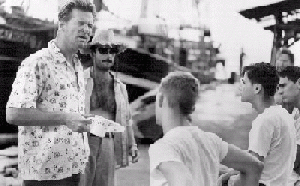White Squall Sea School Drama Struggles to Stay Afloat
You can't fault the judgment of director
Ridley Scott in choosing this project. It
features plenty of opportunities for him to
display his ability to capture stunning
visuals and thrilling action sequences,
talents that helped to make films like
Alien, Bladerunner, and Thelma
and Louise so impressive. Plus, he got to
work in the Caribbean for a few months,
which has its advantages.
In 1960, a group of misfit teenage boys
set sail on the ocean school ship Albatross,
a kind of floating vocational school for sailors.
On the return leg of their voyage, they ran into
some extremely rough weather, and the ship
sank, taking with it a handful of the crew. It's
an interesting and exciting story, but Hollywood
wisdom tells us that documentaries don't
make that much money.
And so, the tale of the crew of the Alba-
tross has become a very unusual version of
those two old Hollywood formulas: the com-
ing-of-age movie and the Blackboard
Jungle movie. Our class consists of two
dozen or so troubled teens, each carrying
aboard his own psychological baggage.
There's the Sissy Kid, who's so tormented by
his brother's fatal plunge from a tower that
he's afraid of heights. There's the Bully Kid,
who acts tough to hide his fear of failure.
There's the Rich Kid, whose father tries to
run his life. There's the Narrator Kid, who
looks too much like Tom Cruise. Surpris-
ingly, there's no Fat Kid or Ethnic Kid to get
involved in the gang's wild shenanigans.
Shouldering the job of making a strong
crew out of this bunch of gangly youths is
Captain Christopher Sheldon (Jeff Bridges),
who handles his tough-love role with quiet
authority. Also on board is a fiery Puerto
Rican chef and a scruffy English teacher,
who walks around reciting the works of dead
poets in the eccentric manner pioneered by
such stars as Robin Williams and Danny
DeVito. The only woman on board, the
Skipper's wife Caroline Goodall, is also the
most naturally likable character, so rest
assured that something really bad will
happen to her by story's end.
The cruise continues through the trou-
bled waters usually encountered in high
school movie dramas, with the unique differ-
ence of its nautical setting. The boys bond
over reckless shore leaves, danger in the
rigging, aggressive Cubans, and a bloody
dolphin, occasionally pausing to cry and hug
each other. By the time they reach South
America, they've become such a closely knit
group that they run screaming over the hills
for a brief reenactment of Lord of the Flies.
If this were an original screenplay, the
third act would feature the Big Game
against a rival ocean school, most likely in
the form of a diving competition. But history
has provided something much more dra-
matic. The relatively calm seas suddenly
rear up in the title typhoon, a kind of mete-
orological anomaly that's almost legendary
among seamen. Bridges and his boys are
caught completely off guard, and the brigan-
tine is quickly capsized and sunk to the
bottom. Here, Scott and his crew are at their
finest - the entire disaster sequence is fright-
ening, suspenseful, and awesomely thrilling.
If the film could've been quickly wrapped up
soon afterward, it might have played much
better. However, events continue to unfold in
an awkward epilog, in which everyone tries
to make sense of the disaster, and Bridges is
brought before a hasty tribunal.
I don't know any more about the actual
events portrayed in White Squall than
is in Todd Robinson's script. It may be
that every word and action of this talented
cast exactly mirrors those of the people they
are playing. But that would mean that life is
far more like a Hollywood movie than it has
been in my experience.
My dictionary defines a "squall" as "a
sudden and violent gust of wind, often with
rain or snow", which surely describes the
weather during the disaster. But there's
another definition that accurately describes
the final sequence: "to cry or scream loudly
and violently".
Since the transcripts were not available
to me at press time, it's hard to be sure, but I
doubt that they'd show one character after
another jumping to his feet to make impas-
sioned speeches in the theatrically dimly-lit
courtroom. I'd also be greatly surprised to
learn that the actual tribunal ended with
every surviving member of the crew joining
in a big group hug. Sure, it's dramatic and
moving, but it's also so phony you can almost
see the wires.
Like White Squall, John Waters' farce
Serial Mom begins with a title telling
the audience that this is a true story, but
Waters goes on to explain that while most
(if not all) of the events and names in his
story have been altered drastically, what
remains strives to serve a "larger truth".
Conversely, while White Squall wants
us to believe that it's based on solid fact, and
that the tragic story of the Albatross can
teach us something important about the way
we live our lives, its overly melodramatic and
manipulative script only prove to serve a
"little white lie".
Front Page || Movie Madness
Copyright © 1994-1997 by Virtual Press/Global Internet Solutions. Internet Daily
News and its respective columns are trademarks of Virtual Press/Global Internet Solutions.
|
 Written by Brian Thomas
Written by Brian Thomas
 Written by Brian Thomas
Written by Brian Thomas